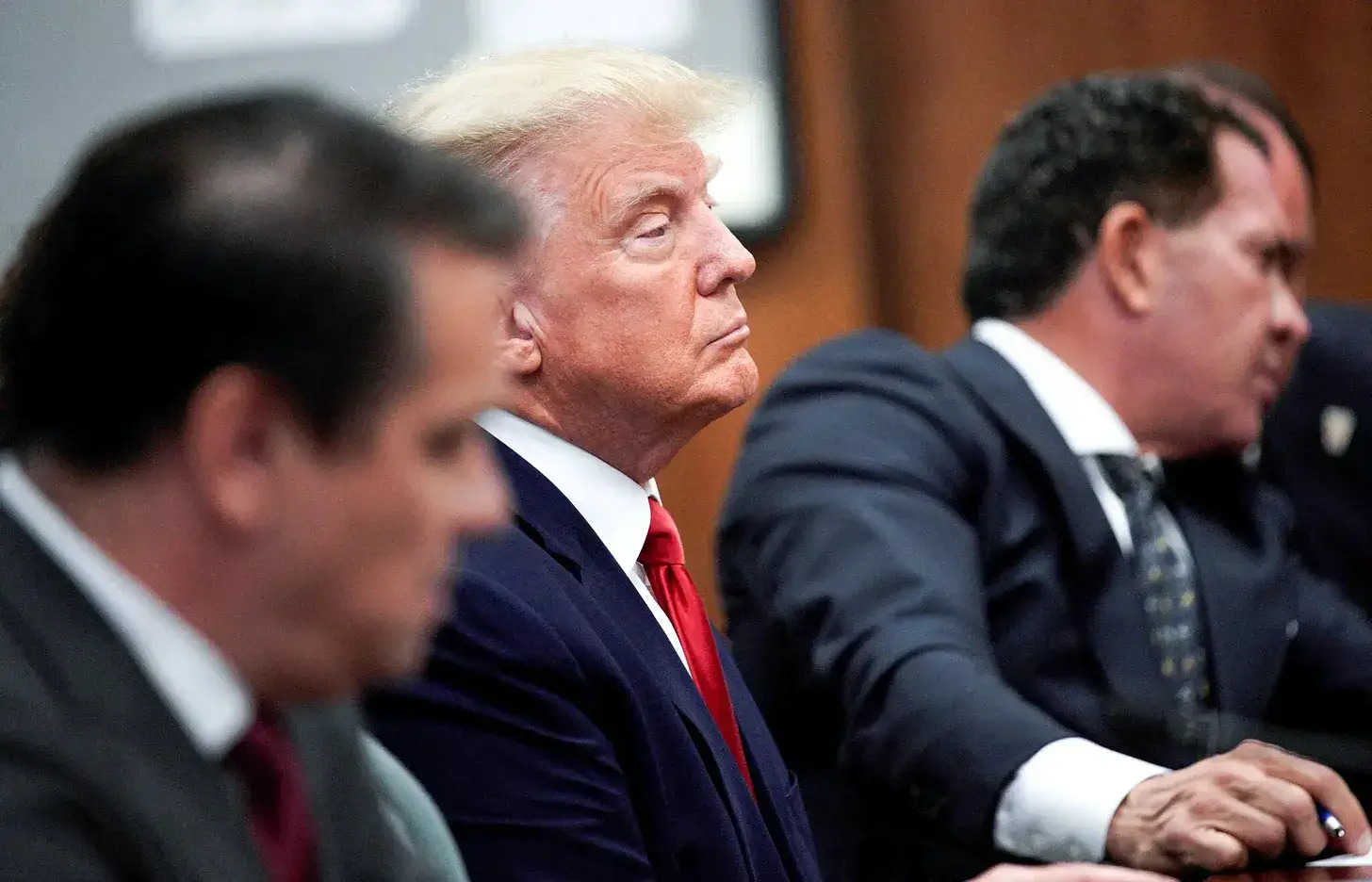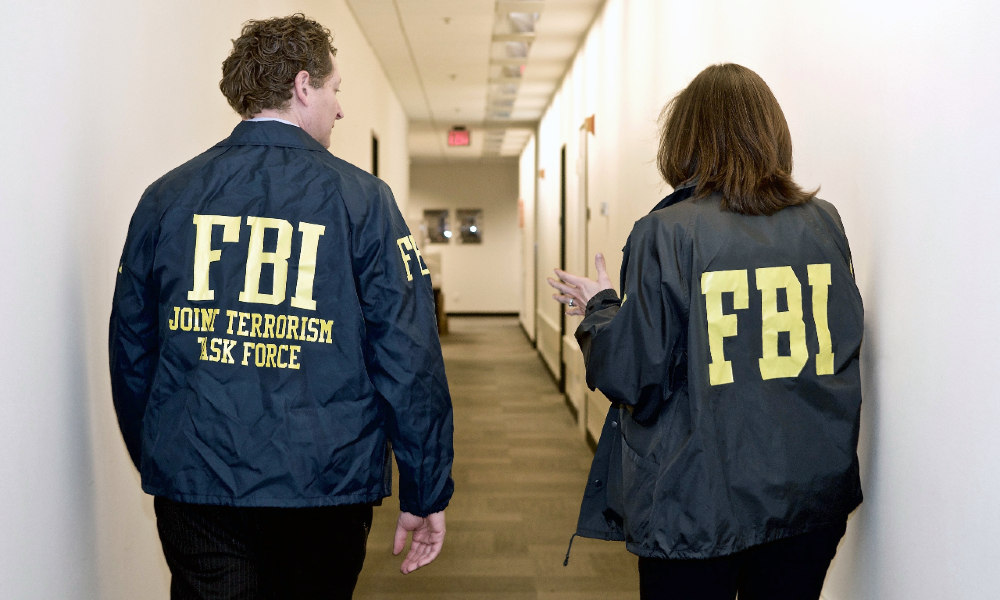Preemption and the Known Unknowns of the Trump Indictment
The indictment tees up some complex and unresolved legal questions—but preemption isn’t a major threat to the prosecution.

Before the New York court unsealed the indictment against former President Donald J. Trump, it was hard to know whether Manhattan District Attorney Alvin Bragg had a strong case. And we still don’t, largely because idiosyncratic New York rules allow Bragg to leave crucial parts of the State’s theory out of the indictment. Given the singular importance of this particular prosecution, and having indicted, Bragg has clearly decided that deferring the reveal on key planks of the state’s legal theory will help him convict. For precisely that reason, however, it is difficult to draw firm conclusions about the quality of the state’s case. There are too many known unknowns.
Still, many commentators have weighed in. Some criticism was less serious than others: former Representative Justin Amash objected to the number of counts (34), even though prosecutors routinely include numerous counts in major white-collar cases. A notable cohort of progressive or otherwise anti-Trump commentators are also scoffing at the indictment, including David Frum, Rick Hasen, Ruth Marcus, and Ian Millhiser. Among left-leaning academics who have been vocal about the indictment, the most critical is Fordham University law professor Jed Shugerman, who called the DA’s indictment a “disaster” and a “legal embarrassment” in the New York Times.
One of Shugerman’s primary arguments is that Bragg charged offenses that are “preempted” by federal law. State law is preempted when it purports to regulate conduct within the exclusive regulatory authority of the federal government. On this influential analysis, preemption is something like an existential threat to the New York prosecution because the charged conduct is the subject of a preemptive election-law provision.
This indictment tees up some complex and unresolved legal questions. But I cannot see how preemption could be a major threat to the prosecution. The weaknesses in the current version of the preemption critique, which are the primary subject of the analysis here, also illustrate more generally the difficulty of judging the prosecution’s case at this time.
The preemption analysis should start with the charged offense, New York Penal Law § 175.10: “A person is guilty of falsifying business records in the first degree when he commits the crime of falsifying business records in the second degree, and when his intent to defraud includes an intent to commit another crime or to aid or conceal the commission thereof” (emphasis added). The statute requires the falsification of a business record with intent to defraud, and it requires that the falsification be part of an attempt to commit another crime, to aid another crime, or to conceal another crime. For the ease of explanation, call the referenced crime the criminal “predicate.”
The indictment identifies thirty-four falsified business records, but it didn’t indicate what the criminal predicates were, because New York law doesn’t require that it do so. But some clues about the predicates can be found in the 13-page Statement of Facts that accompanied the indictment, as well as from Bragg’s comments in a press conference following the arraignment.
The statement creates certain inferences about the predicates. Generally speaking, the statement describes an “unlawful scheme” designed to “influence the 2016 presidential election by identifying and purchasing negative information about [Trump] to suppress its publication and benefit the Defendant’s electoral prospects.” In short, the DA alleges what the popular press calls a catch-and-kill scheme, which itself consists of more specific unlawful activity. The scheme itself was illegal, says the indictment and accompanying statement, as was much of the activity used to effectuate it. Some combination of the activity used to effectuate the scheme and the scheme itself predicates each of the thirty-four charges under § 175.10. The second paragraph of the indictment indicates that the predicating criminality includes (1) violations of “election laws” and (2) violations associated with “mischaracterize[ing], for tax purposes, the true nature of the payments[.]” The third paragraph makes clear that the election law predicates include Michael Cohen’s federal conviction for “making an illegal campaign contribution.” In paragraphs 41 through 44, the statement alleges that Cohen worked with Trump and American Media Inc. (AMI), the parent company of the National Enquirer, to effectuate the scheme. Those paragraphs also recite AMI’s agreement that it purchased the salacious stories without ever having intended to publish them.
The Bragg press conference provided some additional clues about the predicates. Bragg repeatedly emphasized that the § 175.10 offense was concealment of prior criminality: “That is exactly what this case is about. Thirty-four false statements made to cover up other crimes.” Bragg’s prepared remarks detailed the catch-and-kill scheme generally, and suggested the DA’s view that the scheme or its parts violated several different criminal laws: (1) New York Election Law § 17-152, making it a crime to conspire to promote a candidacy by unlawful means; (2) federal limits on campaign contributions (federal election law); (3) New York laws violated by false statements on AMI’s books; and (4) tax laws violated by a mischaracterization someone made or planned to make to taxing authorities.
The major point is this: Bragg is sketching a lot of different predicates involving a lot of different people. Importantly, the predicates do not have to be crimes committed by Trump; they can be crimes committed by Cohen, AMI, or someone else. So the universe of predicates might look something like a 2x2x2 grid: (1) federal tax law violations by Trump; (2) federal tax law violations by third parties; (3) New York tax law violations by Trump; (4) New York tax law violations by third parties; (5) federal election law violation by Trump; (6) federal election law violations by third parties; (7) New York Election Law § 17-152 violations by Trump; and (8) § 17-152 violations by third parties. The list is a touch under-inclusive, because it doesn’t capture the possibility that AMI’s false statements violated some other provision of New York law, which is something that Bragg alluded to several times in his remarks.
Shugerman’s preemption argument revolves around a preemption provision in federal election law stating that “the provisions of this Act ... supersede and pre-empt any provision of state law with respect to election to federal office.” The Federal Election Commission (FEC) issued a Rule interpreting the statute, which states that preemption reaches:
[1] Organization and registration of political committees supporting Federal candidates;
[2] [d]isclosure of receipts and expenditures by Federal candidates and political committees;
[and 3] [l]imitation on contributions and expenditures regarding Federal candidates and political committees.
The FEC Rule is widely treated as indicative of the statutory provision’s preemptive scope.
Now think about that preemption provision in relationship to the universe of potential predicates. Start with predicates (1) through (4), which are based on state and federal tax violations by Trump or others. The preemption provision has no effect whatsoever if a § 175.10 prosecution is predicated on tax-law crimes. Shugerman acknowledges this, but suggests it may not be significant because “[t]he underlying crime, as best as we can tell from Mr. Bragg’s news conference and a statement to the press, is a campaign finance violation[.]” As explained above, however, Bragg laid out many predicates other than these campaign finance (election) crimes.
But it’s not clear that preemption would doom a § 175.10 case prosecuted with election-law predicates, either. Consider predicates (5) and (6), where the crimes are either violations of federal election law by Trump or by third parties. Recall that Cohen already pleaded guilty to a crime under federal election law. Under these scenarios, the § 175.10 counts could be predicated on the federal crime for which Cohen has already been convicted. States attach consequences to federal convictions all the time—making them elements of other crimes, sentencing enhancements, or grounds for bar discipline. Imagine something as simple as lying to the state bar about a federal election conviction. If the preemption argument on predicates (5) and (6) is right, then a state bar wouldn’t be permitted to punish the applicant for concealing it.
In a previous blog post, Shugerman wrote: “I think it’s a very hard case to say that a state can turn a federal filing rule into a state filing crime.” That might be true in cases where a state defines a criminal offense just for violating federal election law. But that isn’t what is happening here. The federal government defines one federal crime, but there was no § 175.10 violation until Trump later generated a different business record to conceal the previously committed federal crime. A state’s ability to attach consequences to concealment of the conviction isn’t barred just because the state can’t criminalize the predicate itself.
The federal government, for its part, regularly predicates serious federal consequences with state convictions—and it does so even though it often lacks constitutional authority to criminalize the predicating criminal offense. For example, Congress has often imposed sentencing enhancements for crimes of violence where the underlying crime is a state offense that Congress couldn’t criminalize. On Twitter, Orin Kerr of Berkeley Law School notes that this sort of cross-jurisdictional incorporation happens all the time. For a parallel based on a familiar tort scenario, think about how often state negligence theories use duties of care that incorporate some preemptive federal safety rule. To my knowledge, in no case has a court even suggested that a federal crime can't be an element of a different state offense just because the federal crime falls within the scope of preemptive federal authority.
This leaves us with predicates (7) and (8)—which would predicate the § 175.10 charge on a state offense involving federal elections—as the only scenarios where preemption questions might have substantial bite. Shugerman reasons that the federal election-law preemption provision is broad, and courts would interpret it to disable any state law that regulates candidates for federal elections. But there are serious questions about whether a provision that preempts “limitation on contributions and expenditures regarding Federal candidates” preempts the § 17-152 violations that Bragg indicates here. It’s not clear whether the alleged § 17-152 violation for conspiring to promote a candidacy by “unlawful means” constitutes a “limitation on contributions and expenditures.” If the “unlawful means” are something other than campaign contributions or expenditures, then the preemption argument is much harder to make.
For the idea that courts will strain to read the election-law preemption clause more broadly, Shugerman points to a decision by the U.S. Court of Appeals for the Eleventh Circuit, Teper v. Miller. The case concerned a member of the Georgia Assembly who wanted to run for federal office. Federal law permitted him to accept contributions because he was running for federal office, while Georgia law barred him from accepting any contributions because he was holding a state office. The Eleventh Circuit determined that state law was preempted because it restricted contributions. The Georgia restriction on contributions was in the heartland of what the federal provision preempts. Teper notes that federal law was non-preemptive when state laws were more “tangential” to the federal contribution and expenditure rules. It’s possible, even likely, that some § 17-152 predicates for a falsification felony qualify as “tangential,” even under the Teper standard. Teper, moreover, is an outlier; other circuits give the federal provision “a narrow preemptive effect.”
In sum, preemption has nothing to do with four of the eight predicates on the grid, and the idea that it preempts counts predicated with federal election-law crimes is exceedingly weak. For the two scenarios where preemption might have bite—if the predicate offenses are state election laws—it’s still not clear that the federal provision is broad enough to preempt. The idea that preemption represents some major threat to this prosecution is a massive reach, based on what we know now.
And the problems with the preemption argument suggest something else: commentators should be more willing to acknowledge that much of the prosecution’s theory remains unknown. And, crucially, it is unknown not because the case is necessarily weak, but because New York law blesses the prosecution with the strategic advantage of withholding the information. Just ask Manhattan lawyers who do this type of litigation regularly. They seem to be saying that there’s nothing particularly unusual about the indictment—other than the defendant.





